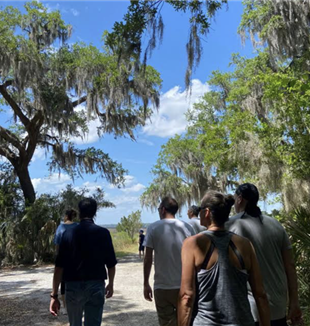
Something that Comes Before
Friends from across the Southeast gather in South Carolina for a diaconia, helping each other to judge with a more human criteria.Over the weekend of April 22-23, the Southeast Diaconia was held at St. Christopher’s Retreat Center in Seabrook, South Carolina. Preparing for this moment together, we recognized the need to make it more feasible for people with families to attend, so we organized a weekend where spouses and children could attend and enjoy alternate proposals while the diaconia met. Attended by 30 adults and 15 children from five different states – Alabama, Georgia, North Carolina, South Carolina, and Tennessee – we uncovered and challenged this common tendency to judge moments with simplistic notions of success and failure. While we don’t often ask if one of our moments together is a ‘success’ or a ‘failure’, we often think in these terms.
On Saturday afternoon, after hearing Fr. Roberto’s witness, a person new to the Movement asked him, “What is your success rate with kids in the Knights?” (The Knights are middle schoolers who follow the educational proposal of CL) Fr. Roberto replied, “How do we measure success? My brother priests and I don’t even think in this way. If someone comes once, isn’t that a success?” This question stayed with me for the rest of the weekend and the days after, as I tried to determine the weekend’s impact in what I later realized were the simplistic notions of success and failure that Fr. Roberto had cautioned against.
Thankfully, during the following week, Lisa reminded me what Marco had proposed to us at the Saturday morning assembly. He had asked, “What is our awareness of this Something that comes before?” Hearing this question anew made me look at reality differently than the question my new friend had asked in front of Fr. Roberto. Marco also had mentioned how struck he’d been by a recent message of the Pope. Marco urged us to “not take for granted this friendship and the sacrifice it takes to be here.” By the end of our two days together, because of the companionship and witness of my friends, I understood how sacrifice is possible when I know my “nothingness is loved.” The invitation of the weekend itself was a sign of Christ’s love calling me to sacrifice my preconceptions and be open like a child.
Was the weekend a “success”? If we limit ourselves to a reductive understanding of the term – to solve problems, for example – then our being together was actually something of a failure, as many of our problems were still waiting for us on Monday morning. But if we open ourselves to a true understanding of the weekend’s purpose – to generate wonder in front of reality – then we are able to judge our time together according to a completely different criterion.
Lisa, for example, witnessed that saying “yes” to serving her parish in concrete ways, with friends from CL, increased her awareness of their belonging. Jenn from Greenville spoke of being surprised by her desire to help with the planning of the presentation on The Religious Sense. And Saturday evening, on the beach, right before we started singing songs and eating s’mores, Maria showed us the Big Dipper and guided our collective gaze to the North Star. What provoked these five families, five couples, and ten friends to pack up and travel several hours to be together? The answer is surprisingly simple: we were responding to “Something that comes before.” For me, the wonder of the weekend was that once again I was given an opportunity to respond to Christ through this friendship. The invitation to gather was a provocation to judge success with a different, more human, criterion.
Michele, Greenville, SC